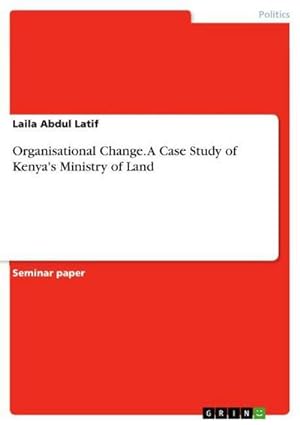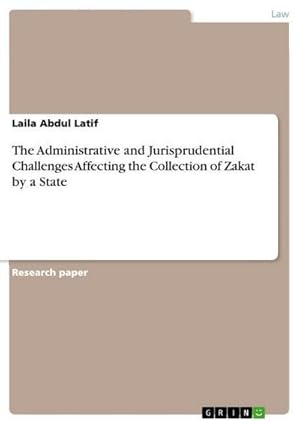laila abdul latif (2 Ergebnisse)
Produktart
- Alle Produktarten
- Bücher (2)
- Magazine & Zeitschriften
- Comics
- Noten
- Kunst, Grafik & Poster
- Fotografien
- Karten
-
Manuskripte &
Papierantiquitäten
Zustand
- Alle
- Neu
- Antiquarisch/Gebraucht
Einband
- alle Einbände
- Hardcover
- Softcover
Weitere Eigenschaften
- Erstausgabe
- Signiert
- Schutzumschlag
- Angebotsfoto
Land des Verkäufers
Verkäuferbewertung
-
Organisational Change. A Case Study of Kenya's Ministry of Land
Verlag: GRIN Verlag, 2015
ISBN 10: 3668040710ISBN 13: 9783668040717
Anbieter: AHA-BUCH GmbH, Einbeck, Deutschland
Buch
Taschenbuch. Zustand: Neu. Druck auf Anfrage Neuware - Printed after ordering - Seminar paper from the year 2015 in the subject Politics - International Politics - Topic: Development Politics, grade: 1,3, University of Duisburg-Essen (Institute of Political Science), course: Public Administration in an International Context, language: English, abstract: This paper is about organisational change in the Kenyan Ministry of Land. Organisational change is defined as a process of moving from one fixed state to another through a series of predictable and preplanned steps in order to implement changes in the governance, design and delivery of public services. These series of predictable and preplanned steps are, in my learned opinion, subject to an analytical framework that guides the organisation to successfully implement the change.There are very few studies on organisational change in the public sector, particularly in Kenya. Hence, this paper is a first attempt at examining the change effected in the organisation of the Ministry of Land in 2012 using Fernandez and Rainey's (2006) model as the analytical framework to analyse the change and discuss whether it was successful or not.It is important to note that little is known about organisational change in a public sector context because studies concerning organisational change in the public sector focus on the national level as a whole instead of specific organisational departments. Hence, studies tend to examine the transition of a centralised form of government to a decentralised one; or an autocracy to a democracy. Whereas it is difficult to pinpoint studies focusing on the organisational level by examining the change in the structure of a governmental department itself by scrutinising the changes in the relationships between different activities and members in the organisation; subdivision and assignment of roles, responsibilities and authority to carry out different tasks. Also, studies tend to emphasise on the content of change, rather than the processes through which organisational change is implemented. As a result, there is hardly any literature that connects the implementation of organisational change to the actual effects or outcomes of change.
-
The Administrative and Jurisprudential Challenges Affecting the Collection of Zakat by a State
Verlag: GRIN Verlag, 2015
ISBN 10: 3668040915ISBN 13: 9783668040915
Anbieter: AHA-BUCH GmbH, Einbeck, Deutschland
Buch
Taschenbuch. Zustand: Neu. Druck auf Anfrage Neuware - Printed after ordering - Research Paper (undergraduate) from the year 2012 in the subject Law - Miscellaneous, grade: A, University of Nairobi (School of Law), course: Public Finance and Financial Services Law, language: English, abstract: State controlled zakat collection is the most effective way of collecting zakat. However, this system is not without challenges that inhibit the size of zakat revenue to be realized. These challenges are administrative and jurisprudential. A number of publicists have written several books and articles on the collection of zakat by a state. However none of them have considered the fact that this system faces challenges when it comes to the collection of zakat. This research, therefore, has attempted to add to the existing literature by identifying what these administrative and jurisprudential challenges are that affect the collection of zakat by a state. Muslim scholars have also been identified who have consistently since the time of the Prophet (peace be on him) argued for the collection of zakat by a state, but have failed to discuss that this system may be facing administrative and jurisprudential challenges that limit the revenue collected through zakat. These scholars were more concerned with the philosophies behind arguing a case for the collection of zakat by a state. Consequently, this research took upon the task of investigating through the case study approach what challenges certain selected countries faced in the collection of zakat, and whether these challenges are administrative and jurisprudential in nature and accordingly pointed out some recommendations that would aid in overcoming the identified challenges.



